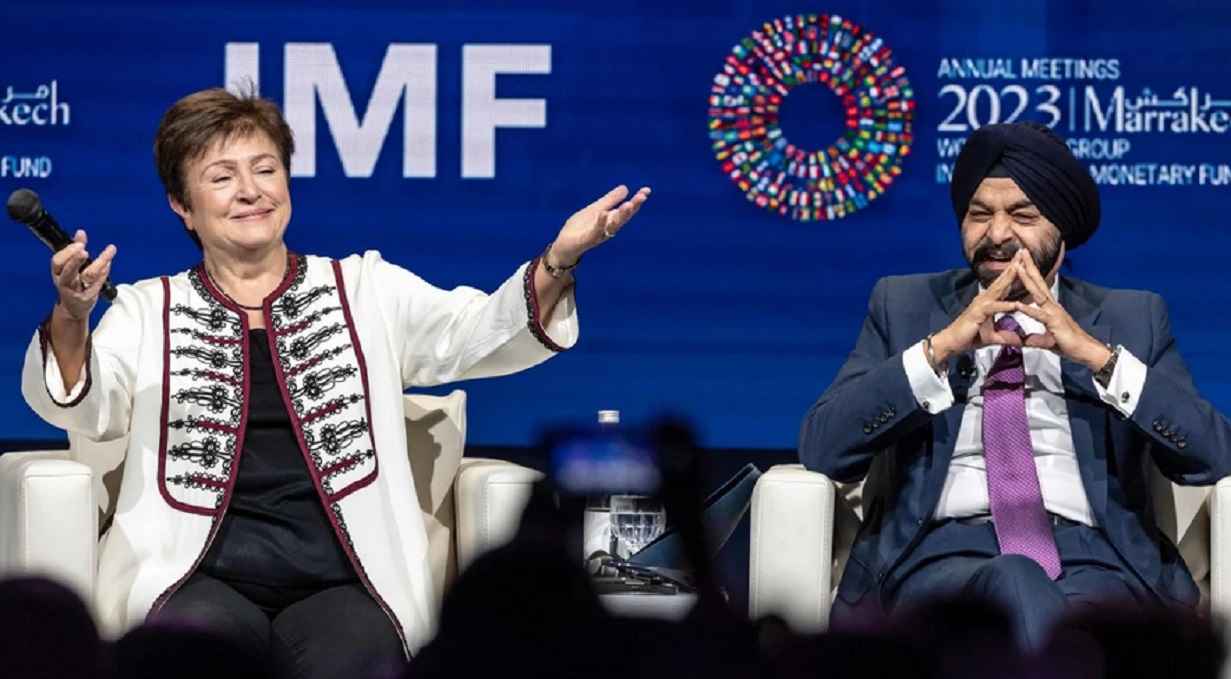The IMF and World Bank, established during the tumult of the Second World War at the Bretton Woods conference in 1944, find themselves amidst a modern-day global struggle for supremacy, primarily between the United States and China.
As the world grapples with geopolitical tensions and an increasing shift towards regional rivalries, the traditional economic models they represent are being challenged.
Here’s how these institutions can adapt and evolve to survive and thrive in a world war on free markets.
The Shifting Global Dynamics
The current global landscape no longer revolves around the Western-dominated ideals of free trade and market economies. Instead, it is marked by the rise of competitive powers and the remarkable success of China’s state-led economy, which has reshaped the narrative of economic success, albeit with certain trade-offs.
Emerging Challenges
The World Bank, once a prominent player in global development, now faces formidable challenges from emerging institutions like the Asian Infrastructure Investment Bank (AIIB) and the New Development Bank established by the Brics nations. Moreover, the growing wave of protectionism, spearheaded by successive US administrations, has led to the resurgence of tariff barriers and other trade restraints.
IMF’s Role and Challenges
While the IMF has played a crucial role as a lender of last resort, its push for the free flow of capital has at times led to economic instability, as evidenced by the 1997 Asian financial crisis. Additionally, the IMF’s efforts to promote equity market development in emerging economies have potentially overshadowed the importance of broader regional bond and debt market growth.
Navigating Complex Geopolitical Realities
In the face of intricate geopolitical, economic, and financial dynamics, it is imperative for the IMF and World Bank to redefine their roles and adapt to the changing global scenario.
Rethinking Policy Orientation
The IMF, dominated by G7 powers, needs to strike a balance between its traditional free market model and the growing concerns of its members regarding economic security and social protection. A crucial consideration here is whether the IMF should retain its orthodox approach or integrate these concerns into its policy framework, albeit at the cost of some economic efficiency.
The Urgency of a Global Consensus
To secure their relevance and influence, the IMF and World Bank must transcend their current limitations. This entails moving beyond their annual meetings and fostering more inclusive gatherings that prioritize universal economic models over the assumed superiority of existing paradigms. Failure to embrace such transformative measures could lead to a fate similar to that of the weakened World Trade Organization.
The Path Ahead
In this critical juncture, it is clear that the survival of the IMF and World Bank hinges on their ability to adapt to the evolving global landscape. An inclusive and progressive approach, steering away from the monopoly of Western-centric ideologies, can pave the way for their continued significance in shaping the future of the global economy. However, if they fail to heed this call for change, the prospect of regional economic arrangements taking over their functions looms large, painting a precarious future for these once indomitable institutions.
Why the G-20 Needs to End Its Communique Gridlock
The latest meeting of the International Monetary Fund and World Bank in Marrakech, Morocco, marks a pivotal moment for the global economy. This year’s G-20 theme, “Embracing Instability,” sheds light on critical economic concerns, including persistent inflation, geopolitical tensions, the surge of AI, and the pressing climate crisis. As the world’s top financial minds convene, it becomes increasingly crucial for the G-20 to address these challenges head-on.
A Disconnected G-20: Struggles with Communique Consensus
Despite the recent issuance of the first joint communique in almost two years, it remains evident that the G-20, comprising both developed and emerging markets, lacks a unified stance on crucial economic and financial risks. The ongoing discord stems from varying perspectives on Russia’s aggression, with the West in direct opposition, China exhibiting partial alignment with Russia, and countries like India and Brazil attempting to remain neutral.
Balancing Responsibilities: The Role of G-20 Finance Officials
While tensions persist, G-20 finance officials maintain that preempting their leaders’ viewpoints falls outside their purview. However, the inability to address the growing challenges, especially concerning Russia’s war and other geopolitical conflicts, raises questions about the effectiveness and purpose of the G-20 meetings. As the global economic landscape continues to evolve, the necessity for cohesive and proactive decision-making becomes increasingly paramount.
For more information on the recent G-20 developments and global economic trends, stay updated with our latest updates and insights.
For further reading:
Stay informed and be a part of the global economic conversation.
